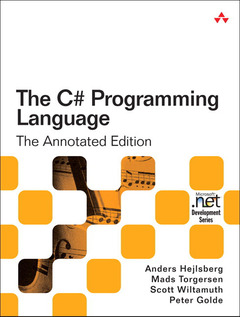Description
C# Programming Language (3rd Ed.)
Author: HEJLSBERG Anders
Language: English
Subject for C# Programming Language:
Approximative price 37.13 €
Subject to availability at the publisher.
Add to cart754 p. · 19x24 cm · Hardback
Description
/li>Contents
/li>
Foreword xi
Preface xiii
About the Authors xv
About the Annotators xvii
Chapter 1: Introduction 1
1.1 Hello, World 2
1.2 Program Structure 4
1.3 Types and Variables 6
1.4 Expressions 10
1.5 Statements 13
1.6 Classes and Objects 18
1.7 Structs 41
1.8 Arrays 43
1.9 Interfaces 46
1.10 Enums 48
1.11 Delegates 49
1.12 Attributes 53
Chapter 2: Lexical Structure 55
2.1 Programs 55
2.2 Grammars 55
2.3 Lexical Analysis 57
2.4 Tokens 61
2.5 Preprocessing Directives 74
Chapter 3: Basic Concepts 87
3.1 Application Start-Up 87
3.2 Application Termination 88
3.3 Declarations 89
3.4 Members 92
3.5 Member Access 95
3.6 Signatures and Overloading 104
3.7 Scopes 106
3.8 Namespace and Type Names 112
3.9 Automatic Memory Management 116
3.10 Execution Order 121
Chapter 4: Types 123
4.1 Value Types 124
4.2 Reference Types 135
4.3 Boxing and Unboxing 137
4.4 Constructed Types 141
4.5 Type Parameters 145
4.6 Expression Tree Types 146
Chapter 5: Variables 149
5.1 Variable Categories 149
5.2 Default Values 154
5.3 Definite Assignment 155
5.4 Variable References 171
5.5 Atomicity of Variable References 172
Chapter 6: Conversions 173
6.1 Implicit Conversions 174
6.2 Explicit Conversions 180
6.3 Standard Conversions 188
6.4 User-Defined Conversions 188
6.5 Anonymous Function Conversions 193
6.6 Method Group Conversions 200
Chapter 7: Expressions 203
7.1 Expression Classifications 203
7.2 Operators 206
7.3 Member Lookup 214
7.4 Function Members 217
7.5 Primary Expressions 238
7.6 Unary Operators 280
7.7 Arithmetic Operators 285
7.8 Shift Operators 295
7.9 Relational and Type-Testing Operators 297
7.10 Logical Operators 307
7.11 Conditional Logical Operators 309
7.12 The Null Coales
These books may interest you

C# 5.0 Programmer′s Reference 53.30 €

C# 7.0 All-in-One For Dummies 46.98 €


